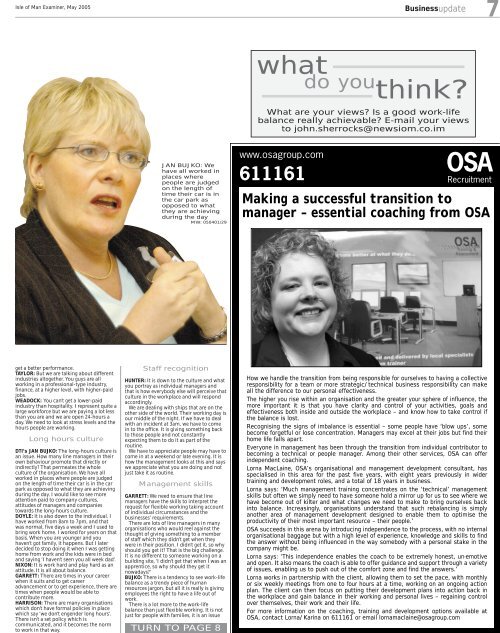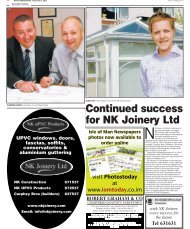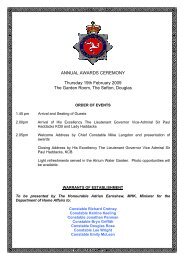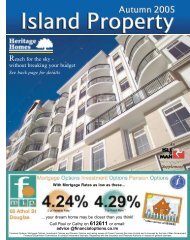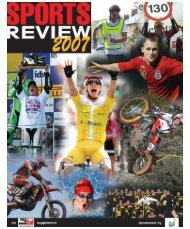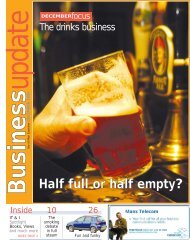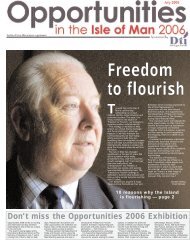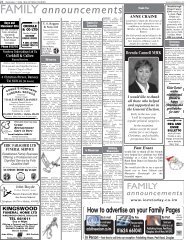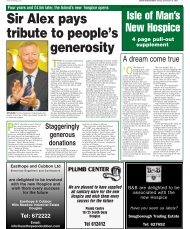Getting the balance right - Isle of Man Today
Getting the balance right - Isle of Man Today
Getting the balance right - Isle of Man Today
Create successful ePaper yourself
Turn your PDF publications into a flip-book with our unique Google optimized e-Paper software.
<strong>Isle</strong> <strong>of</strong> <strong>Man</strong> Examiner, May 2005 Businessupdate7what do youthink?What are your views? Is a good work-life<strong>balance</strong> really achievable? E-mail your viewsto john.sherrocks@newsiom.co.imJAN BUJKO: Wehave all worked inplaces wherepeople are judgedon <strong>the</strong> length <strong>of</strong>time <strong>the</strong>ir car is in<strong>the</strong> car park asopposed to what<strong>the</strong>y are achievingduring <strong>the</strong> dayMW: 050401/29www.osagroup.com611161OSARecruitmentMaking a successful transition tomanager – essential coaching from OSAget a better performance.TAYLOR: But we are talking about differentindustries altoge<strong>the</strong>r. You guys are allworking in a pr<strong>of</strong>essional-type industry,finance, at a higher level, with higher-paidjobs.WEADOCK: You can’t get a lower-paidindustry than hospitality. I represent quite alarge workforce but we are paying a lot lessthan you are and we are open 24-hours aday. We need to look at stress levels and <strong>the</strong>hours people are working.Long hours cultureDTI’s JAN BUJKO: The long-hours culture isan issue. How many line managers in <strong>the</strong>irown behaviour promote that directly orindirectly? That permeates <strong>the</strong> wholeculture <strong>of</strong> <strong>the</strong> organisation. We have allworked in places where people are judgedon <strong>the</strong> length <strong>of</strong> time <strong>the</strong>ir car is in <strong>the</strong> carpark as opposed to what <strong>the</strong>y are achievingduring <strong>the</strong> day. I would like to see moreattention paid to company cultures,attitudes <strong>of</strong> managers and companiestowards <strong>the</strong> long-hours culture.DOYLE: It is also down to <strong>the</strong> individual. Ihave worked from 8am to 7pm, and thatwas normal, five days a week and I used tobring work home. I worked for years on thatbasis. When you are younger and youhaven’t got family, it happens. But I laterdecided to stop doing it when I was gettinghome from work and <strong>the</strong> kids were in bedand saying ‘I haven’t seen you all week dad’.NIXON: It is work hard and play hard as anattitude. It is all about <strong>balance</strong>.GARRETT: There are times in your careerwhen it suits and to get careeradvancement or to get experience, <strong>the</strong>re aretimes when people would be able tocontribute more.HARRISON: There are many organisationswhich don’t have formal policies in placewhich say ‘we don’t engender long hours’.There isn’t a set policy which iscommunicated, and it becomes <strong>the</strong> normto work in that way.Staff recognitionHUNTER: It is down to <strong>the</strong> culture and whatyou portray as individual managers andthat is how everybody else will perceive thatculture in <strong>the</strong> workplace and will respondaccordingly.We are dealing with ships that are on <strong>the</strong>o<strong>the</strong>r side <strong>of</strong> <strong>the</strong> world. Their working day isour middle <strong>of</strong> <strong>the</strong> night. If we have to dealwith an incident at 3am, we have to comein to <strong>the</strong> <strong>of</strong>fice. It is giving something backto those people and not constantlyexpecting <strong>the</strong>m to do it as part <strong>of</strong> <strong>the</strong>routine.We have to appreciate people may have tocome in at a weekend or late evening. It ishow <strong>the</strong> management looks at this and sayswe appreciate what you are doing and notjust take it as routine.<strong>Man</strong>agement skillsGARRETT: We need to ensure that linemanagers have <strong>the</strong> skills to interpret <strong>the</strong>request for flexible working taking account<strong>of</strong> individual circumstances and <strong>the</strong>businesses’ requirements.There are lots <strong>of</strong> line managers in manyorganisations who would reel against <strong>the</strong>thought <strong>of</strong> giving something to a member<strong>of</strong> staff which <strong>the</strong>y didn’t get when <strong>the</strong>ywere in <strong>the</strong>ir position. I didn’t get it, so whyshould you get it? That is <strong>the</strong> big challenge.It is no different to someone working on abuilding site, ‘I didn’t get that when I was anapprentice, so why should <strong>the</strong>y get itnowadays?’BUJKO: There is a tendency to see work-life<strong>balance</strong> as a trendy piece <strong>of</strong> humanresources jargon, but all it is really is givingemployees <strong>the</strong> <strong>right</strong> to have a life out <strong>of</strong>work.There is a lot more to <strong>the</strong> work-life<strong>balance</strong> than just flexible working. It is notjust for people with families, it is an issueTURN TO PAGE 8How we handle <strong>the</strong> transition from being responsible for ourselves to having a collectiveresponsibility for a team or more strategic/technical business responsibility can makeall <strong>the</strong> difference to our personal effectiveness.The higher you rise within an organisation and <strong>the</strong> greater your sphere <strong>of</strong> influence, <strong>the</strong>more important it is that you have clarity and control <strong>of</strong> your activities, goals andeffectiveness both inside and outside <strong>the</strong> workplace – and know how to take control if<strong>the</strong> <strong>balance</strong> is lost.Recognising <strong>the</strong> signs <strong>of</strong> im<strong>balance</strong> is essential – some people have ‘blow ups’, somebecome forgetful or lose concentration. <strong>Man</strong>agers may excel at <strong>the</strong>ir jobs but find <strong>the</strong>irhome life falls apart.Everyone in management has been through <strong>the</strong> transition from individual contributor tobecoming a technical or people manager. Among <strong>the</strong>ir o<strong>the</strong>r services, OSA can <strong>of</strong>ferindependent coaching.Lorna MacLaine, OSA’s organisational and management development consultant, hasspecialised in this area for <strong>the</strong> past five years, with eight years previously in widertraining and development roles, and a total <strong>of</strong> 18 years in business.Lorna says: ‘Much management training concentrates on <strong>the</strong> ‘technical’ managementskills but <strong>of</strong>ten we simply need to have someone hold a mirror up for us to see where wehave become out <strong>of</strong> kilter and what changes we need to make to bring ourselves backinto <strong>balance</strong>. Increasingly, organisations understand that such rebalancing is simplyano<strong>the</strong>r area <strong>of</strong> management development designed to enable <strong>the</strong>m to optimise <strong>the</strong>productivity <strong>of</strong> <strong>the</strong>ir most important resource – <strong>the</strong>ir people.’OSA succeeds in this arena by introducing independence to <strong>the</strong> process, with no internalorganisational baggage but with a high level <strong>of</strong> experience, knowledge and skills to find<strong>the</strong> answer without being influenced in <strong>the</strong> way somebody with a personal stake in <strong>the</strong>company might be.Lorna says: ‘This independence enables <strong>the</strong> coach to be extremely honest, un-emotiveand open. It also means <strong>the</strong> coach is able to <strong>of</strong>fer guidance and support through a variety<strong>of</strong> issues, enabling us to push out <strong>of</strong> <strong>the</strong> comfort zone and find <strong>the</strong> answers.’Lorna works in partnership with <strong>the</strong> client, allowing <strong>the</strong>m to set <strong>the</strong> pace, with monthlyor six weekly meetings from one to four hours at a time, working on an ongoing actionplan. The client can <strong>the</strong>n focus on putting <strong>the</strong>ir development plans into action back in<strong>the</strong> workplace and gain <strong>balance</strong> in <strong>the</strong>ir working and personal lives – regaining controlover <strong>the</strong>mselves, <strong>the</strong>ir work and <strong>the</strong>ir life.For more information on <strong>the</strong> coaching, training and development options available atOSA, contact Lorna/Karina on 611161 or email lornamaclaine@osagroup.com


